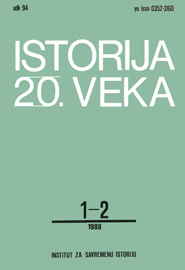DENACIONALIZACIJA, ISELJAVANJE I GENOCID NA BALKANU U TOKU DRUGOG SVETSKOG RATA
DENATIONALIZATION, EMIGRATION AND GENOCIDE IN THE BALKANS DURING WORLD WAR II
Author(s): Dušan LukačSubject(s): Geography, Regional studies, Military history, Recent History (1900 till today), Studies in violence and power, WW II and following years (1940 - 1949), Fascism, Nazism and WW II, History of the Holocaust, Migration Studies, Wars in Jugoslavia
Published by: Institut za savremenu istoriju, Beograd
Keywords: Balkans; WWII; denationalization; emigration; genocide; Nazi Germany;
Summary/Abstract: This supplement gives in a concise form, based on the data obtained from primary sources and abundant literature, all aspects and forms of the denationalization and genocide measures which were exercised by the enemy and domestic quislings during World War II against discriminated individuals as well as peoples in the south-east of Europe, firstly towards Jews, Serbs, Slovenes and Gypsies. The first chapter deals with the initial phase of the war, in the south-east also known as the arbitrage period in which the Axis powers, Germany and Italy, acting as judges, used the quarrels between Hungary and Rumania over the mixed inhabited Transylvania, to strengthen their influence in these two countries. The second chapter is dealing with various forms of forced emigration or rough turning out of homes of entire nationalities into other regions and countries. This system of racial purification of certain countries or regions was most roughly and massively applied in parts of Yugoslavia, especially towards Slovenes and Serbs. Stated facts bring on the conclusion that the major part of the Yugoslav citizens were, for a longer or shorter period, driven off or simply thrown out of their homes.The third chapter deals with document verified data that the German citizens also had to abandon their homesteads in especially large numbers towards the end of the war. Before the retreat of the German army in 1944, Volksdeutschers had to leave their homes and start the exodus towards the Reich. The fourth chapter is dealing with long-term measures of denationalization of certain nations: in the field of culture and education - no use of mother tongue or alphabet allowed; national schools closed down; all forms of cultural life hindered or forbidden, while the enemy's culture is forced upon the people; all forms of national tradition destroyed or erased etc; in the field of economy - confiscation of personal property; certain professions not allowed; in the field of religion - converting into the other nation's religion, as during the ,,NDH” (Independent State of Croatia) when the orthodox were converted into Roman Catholics, etc. This chapter also describes the system of race checks and administrative transferring of individuals and parts of the population into another, „higher" nation, as was done in parts of Slovenia which were included in the Reich.
Journal: Istorija 20. veka
- Issue Year: 1988
- Issue No: 1+2
- Page Range: 53-85
- Page Count: 33
- Language: Serbian

